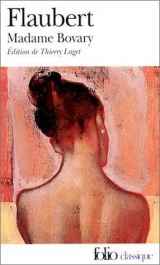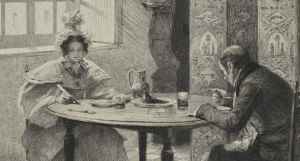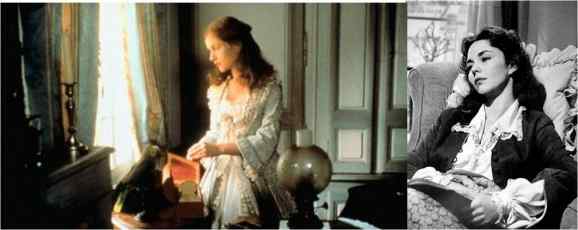Madame Bovary or the Struggles of Individual Psychology vs. Social Oppression

In Madame Bovary, Flaubert combines the study of individual psychology with the social observation of contemporary France. Both are inseparable, and the greatest achievement of the novel is to present a fierce social critique through the study of a specific case. The novel focuses on a middle-class provincial girl, unhappily married and drastically bored with her restricted life who commits suicide in order to escape her misery. Emma’s story is not unusual – on the contrary, it is representative of Flaubert’s oppressive times. To denounce the injustices of 19th century French society, the author decides to place a woman at the centre of the narration, explore her interiority in the most intimate way and examine her difficult interactions with the dominant social institutions.
Flaubert concentrates on the psychological study of the character with precision and accuracy, showing the destruction of one’s existence within one’s mind. He gives us a detailed account of Emma’s routine, but never lets her speak by herself and suppresses her voice. He deliberately refuses to use the first person narrative as a way to silence her, emphasizing Emma’s daily oppression. Instead, he employs the ‘style indirect libre’ and allows the reader to penetrate her private thoughts in the most voyeuristic fashion. Emma instantly becomes transparent to us as we learn all about her feelings, dreams, fears and secrets. Thus, the reader is tied to Emma’s psychology as she is unable to hide anything from us, and is therefore vulnerably exposed to our judgement.
The author applies different stylistic techniques to depict Emma ‘s inner-entity. As mentioned earlier, free indirect speech is fundamental in drawing the reader inside Emma’s head, like a psychologist who meticulously dissects her mind. But it also allows us to switch from one character to another and alternate between different viewpoints. Alan Raitt writes in The Originality of Madame Bovary that ‘Flaubert prefers to shelter behind one or other of the characters in the novel and to provide only such information as he or she might possess or notice.’ Thus, Flaubert is mainly interested in the characters’ psychologies and the different ways each one interprets a certain event. ‘She was not happy–she never had been. Whence came this insufficiency in life–this instantaneous turning to decay of everything on which she leaned?’ Here, the narrative explicitly adopts Emma’s perspective, and the use of rhetorical questions directly places the reader within Emma’s viewpoint as we infiltrate an intimate moment of incertitude about her life.

The lack of dialogue is a key element in Flaubert’s study of Emma’s psyche. She barely intervenes or speaks her mind, and her voice is a product of her interiority, unexpressed and unheard by other characters. As Raitt said, it is ‘designed to persuade the reader that he is in direct contact’ with Madame Bovary. The long slow-paced descriptions echo the character’s boredom and anchor her into a specific mediocre environment. Descriptions of landscape, for example, illustrate Emma’s deepest experiences. She sees Yonville’s ‘open space spread away with a monotonous movement till it touched in the distance the vague line of pale sky’, ‘immovable’, with ‘anchored ships’ and ‘motionless, black fishes’. She perceives her surroundings as static, like her dull and grey life. The choice of verb tenses and imagery are representative of Flaubert’s desire to communicate Emma’s inner malaise. Through the lexical field of stagnation and the use of l’imparfait, which suggests habits and monotony, Flaubert intimately ties the landscape -and the book’s literary style- to her internal turmoil.
But beyond the study of Emma’s psychology, Madame Bovary tackles many social issues and constitutes a fierce critique of Flaubert’s times. The subtitle ‘mœurs de province’ puts forward the intention to observe provincial behaviours. The author demonstrates how modern society imprisons Emma and modifies her psychological state – she is trapped within stifling institutions that define her social role as a woman, wife and mother. ‘The whole of her immediate environment- dull countryside, imbecile petty bourgeoisie, life in its ordinariness – seemed a freak, a particular piece of bad luck that had seized on her.’ Flaubert conveys the vulgarity and brutality of industrialised times and attacks its main representations -marriage, agriculture, trade, bank, science, class, religion, law, medicine and education. Stylistically, Flaubert uses irony and ambiguous juxtapositions of words, images and ideas to present an acute caricature of 1850s France.
‘One one level, the disease is social’ writes Brombert. Social class is a major theme in the novel as we gain insight into the agricultural and materialistic middle-class of the time. Flaubert ridicules the petty bourgeoisie who represent values of consumerism and narrowness of mind. High-spirited values are incompatible to this class. For instance, when Emma and Rodolphe declare their love to each other, the narrative switches from their passionate viewpoint to the down-to-earth sale of a cow at the comices agricoles, jeopardising the romantic atmosphere. This is a perfect example of Flaubert’s sense of irony and the use of juxtaposition: by paralleling two contrasting actions, the readers capture all the ridicule of the bourgeoisie who try unsuccessfully to elevate themselves to romantic ideals. A number of characters represent this skimpy middle-class: the pompous and cliché-ridden Homais, the hypocritical and selfish Rodolphe from the upper society, the bureaucratic Lieuvain or the rough father Rouault. Leon becomes an urban sophisticated upper-class, and abandons his romantic aspirations to believe in materialism. Lheureux represents the greedy and sinister merchant who drives Emma into massive debt, ‘buying on credit, borrowing, signing notes and then renewing those notes’. In this period of heavy economic changes, ‘the appetites of the flesh, the craving for money, the melancholy of passion, all blended together in one general misery’. Thus, possessions, lust, finances and romanticism prevail over simple emotions, and social hierarchy pressurizes the individual to conform to the norm.

At the time, marital and religious institutions were at the core of society’s hierarchical functioning, and provided guidelines on how to behave properly in social and spiritual terms. Citizens had to follow the given order both at home and in faith. Through the portrayal of Emma and Charles’s mediocre marriage, Flaubert shows how these rules restrained women and led to adultery and unhappiness. Emma’s only way to escape her unfruitful marriage is to commit suicide. As a matter of fact, we do not hear of her before the wedding as she is not given a voice, and we only get Charles’ perception of her when they meet. Thus, she is defined by her role as Madame Bovary and not Emma (as we can see in Flaubert’s choice of title). The wedding scene is representative of marriage’s façade; the feast seems too big, as if its function was only to impress. The guests, ‘their hair greasy with rose-pomade, and very much afraid of dirtying their gloves,’ seem unrefined, but they try to look sophisticated, just as the wedding constructs an artificial image of elegance and wealth. Emma’s belief in marriage as emancipation is completely ruined, especially when she discovers Heloise’s bridal bouquet in Charles’ house which does not match with the sentimental fictions she expected to come true: ‘Before she married, she thought she was in love; but the happiness that should have resulted from that love, somehow had not come’. Thus, marriage and love become unreachable; as institutionalized concepts, they create expectations and disillusionment amongst those who firmly believe in them.
In the same way, religion seems to disappoint its followers, and Flaubert mocks the hypocrisy and materialistic interest of the Church. Emma’s upbringing in a disciplined convent has channelled her desires for passion. Thus, the repression of her natural desires has led her to obedience, and has left a strong feeling of ‘inadequacy in her life’. Religion doesn’t help Emma: she tries to protect herself from Leon’s seduction in a church, yet she still ends up having an affair with him. Or when Emma turns to the priest Bournisien to find an answer to her deep unease, he doesn’t listen to her, preoccupied by insignificant matters: ‘What! What does it matter? It seems to me that when one has firing and food…’. He assumes that materialistic fulfilments like firewood, bread and sugar will bring her peace; hence the Church has been infected by bourgeois materialism.
This period was marked by a strong belief in science and rationalism, and Flaubert mocks the bourgeoisie’s misplaced trust in medicine through Homais and Charles. Homais, craving for more power, pushes Charles to operate on Hippolyte, but the surgery is a disaster. Homais is presented as an arrogant and self-interested pharmacist, and refuses to share the responsibility for Hippolyte’s surgery, leaving it all to the weak and incompetent Charles, whose mediocrity is highlighted throughout the entire novel. Raitt wrote that ‘Charles stands for everything that stifles and ultimately crushes Emma: dullness, prosaicism stupidity, lack of imagination.’ His conversation is described as “flat as a street pavement […]He couldn’t swim, or fence, or fire a pistol, and was unable to explain a riding term she came across in a novel.’ Thus, Charles does not conform to the social expectations of manhood, and seems unfit for his profession which requires self-confidence and expertise.

Madame Bovary paints a remarkable representation of France’s debauchery and mediocrity in 1850. As we enter Emma’s mind, we understand the social oppression that individuals, especially women, had to face at the time. Yet Flaubert claimed that it wasn’t his intention to point out society’s dysfunctions; his social criticism is never explicitly addressed, and he prefers to establish an implicit study of contemporary society. Raitt says that Flaubert ‘never thought it the business of the novel to inform its readers about the workings of any given institution or sector of society […] no more than an incidental side-effect.’ Thus, the book must not be entirely regarded as a social commentary, but rather as a modern work that uses an innovative style to depict a woman’s psychological state, in relation to her environment.
Works Cited
Primary text: Flaubert, Gustave Madame Bovary (UK, Penguin Popular Classics, 1995)
– Brombert, Victor, ‘Madame Bovary: The Tragedy of Dreams’, The novels of Flaubert, A Study of Themes and Techniques (US, Princeton University Press, 1966)
– Flaubert, Gustave, Madame Bovary, meours de province (France, Folio Classique Gallimard, new edition 2001) preface by Laget, Thierry
– Raitt, Alan, The Originality of Madame Bovary (Bern, Peter Lang AG, European Academic Publishers, 2002)
– Starkie, Enid ‘Part Two: The Masterpiece’, Flaubert: The Making of the Master (London, Weidenfeld and Nicolson, 1967)
What do you think? Leave a comment.











Good job on the analysis.
Thank you!
Why are all the stellar classics lead by famed female heroines that are too often about personal freedom thru means of sexual compromise leading to abject misery and ultimate demise…?
More often than not due to the restraining culture against women’s sexuality; in the 19th century women were expected to make themselves useful as sexual objects when necessary, such as for the formation of families, but women actually having sexual desire was considered taboo.
This is one of my all-time favorites.
Very memorable passage:
‘As for Emma, she didn’t think she was in love with him. Love, she believed, should arrive all at once with thunder and lightning – a whirlwind from the skies that affects life, turns it every which way, wrests resolutions aside like leaves, and plunges the entire heart into an abyss. She did not know that rain forms lakes on house terraces when the gutters are stopped up, and she remained secure in her ignorance until she suddenly discovered a crack in the wall.’
Gustave Flaubert has been such a master of the craft!
Stunningly written book but the story itself I found too romantic for my own taste.
I haven’t read this one for a VERY long time, I do remember it to be very fast paced.
I read this book many years ago while in college and was fascinated by it. I was also fascinated by my professor it was combination of an awaking of culture, literature and new hormones. I remember being so captivated by this character that I wrote a love note to my professor and had my friend slide it under his door and signed it “Madame Bovary.” Thanks for that memory!
I had fashioned Ms. Bovary as an independent and strong character that took matters into her own hand. I felt she was in as much control that was allowed to women at that time. She did what she had to do to survive and then lack thereof or survives in a different realm. I have a different feel for her character now that I read your article I can reflect back and see what you are describing. The technique you speak of regarding Flaubert suppressing her voice is interesting. I understand what you are saying however; at the time of my reading I did not interpret it that way. So thank you for that insight. I will need to revisit this story and as time and experiences have been allotted to me I am sure I will see things in a different light.
Haha thanks for sharing this story, it’s a really good memory and I’m glad this article has revived it!
I understand why we can see Emma as a strong character, and it is true that she has some kind of control over her life, but to a certain extent. I’ve always felt she was more submissive to her times and the dominating patriarchy, and was less of an active resistant, but more of a passive one, if that makes sense… I am happy that my article has opened new interpretations and glad that you enjoyed it!
This is good subject matter to discuss. Flaubert was a master at making his message heard without having to clearly state his opinion.
It would have been better if you defined what exactly you mean by her “psychology” and her “environment”. These are massive terms and can’t just be tossed in your analysis if you want to have a coherent argument. Although I did enjoy your thoughts on French society in the 1850’s. There are many modern parallels to be made.
I read Madame Bovary a couple of years ago. It is an excellent book and one of my favourite french classics.
Would it have killed you to put indication of a spoiler before revealing how the novel ends in the first lines? I was almost finished the novel, thanks for ruining it for me…
What in the world? You’re reading an in-depth literary analysis of the book. I advise you against reading if you’re not done with the book. It’s not rocket science, much less the author’s fault at all. Idiot.
I was recently asked what the most disturbing book I had ever read and why? Madame Bovary by Gustave Flaubert was the first thing that came to mind. I first read it back in ’92 and it has continued to haunt me. It truly is a masterpiece in literature. It flows so well that once you start to read it, you can’t stop.I have no idea how many times I have read it. Yet, it has always left me feeling tainted and thoroughly disgusted with humanity. It can so easily mirror situations taking place in my life and of those I know. Every time I see those situations taking place it instantly reminds and sends me back to that novel to confirm my suspicions. I then end up reading it all over again and disturbingly find it. Always ending up feeling total contempt, disgust and just sick. It’s so good, I doubt I could ever stop trying to link things with it and that for me is disturbing.
There is an irony: Emma’s unhappy state mirrors the unhappy state of Charles’s (her husband’s) first marriage to an older woman.